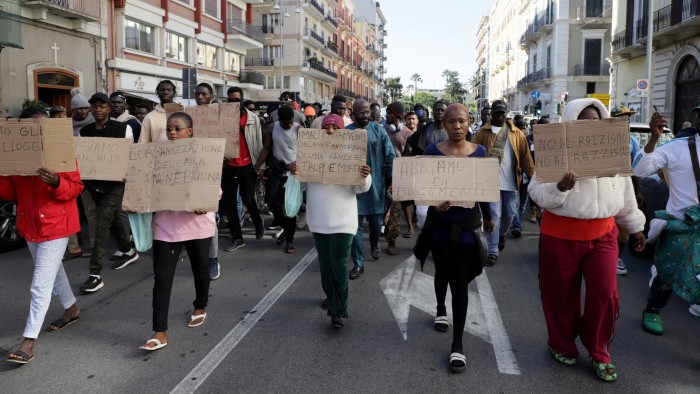Migrants ‘drugged and beaten’ at privately run Italian detention centres

Unlock the Editor’s Digest for free
Roula Khalaf, Editor of the FT, selects her favourite stories in this weekly newsletter.
Foreign migrants awaiting deportation from Italy have been beaten with truncheons and given unprescribed psychotropic drugs at some of the country’s privately managed immigration detention centres, European investigators have found.
The Council of Europe on Friday urged Prime Minister Giorgia Meloni’s government to take “resolute action” to address the “serious and disturbing” conditions observed during recent visits to four of Italy’s nine functioning migrant detention centres run by various private contractors.
Conditions inside the facilities — where rejected asylum seekers can be held in prison-like conditions for up to 18 months while awaiting repatriation — are coming under a growing spotlight following a series of suicides, suicide attempts, episodes of self-harm, hunger strikes and riots by inmates over the past two years.
The committee on the prevention of torture from the international organisation that upholds human rights warned in a report that the “gravity of the situation” in the facilities raised serious questions about Italy’s plan to hold up to 3,000 asylum-seekers in privately operated offshore centres in Albania.
Rome has awarded a €151mn contract to a private company to run the Albanian centres, which were declared ready to operate several months ago. Yet they remain empty, as Italy’s immigration courts have refused to sanction holding asylum seekers in locked facilities while their claims are assessed.

Asylum-seekers in Italy mostly live in open accommodation, or even independently, while their claims are considered, and they often work. But Meloni’s rightwing government hopes the threat of incarceration in Albania will prove a deterrent effect and cut the number of people attempting to reach the country.
The Council of Europe report urged Italian authorities to “reflect” on its experiences with the “privatisation” of closed migration detention centres, and reconsider “whether this is a suitable model”.
Officials from the interior ministry in Rome did not respond to a request for comment, but told Italian reporters that the report was based on “partial and incomplete information”.
In the 44-page account of their visits, delegates said the detention centres — which all-told house several hundred people — were “not fit for purpose” and comprised grim, jail-like facilities without communal rooms, and cage-like outdoor exercise spaces without greenery. The delegation also noted “high levels of distress” among detainees.
At a centre in Potenza, the visitors observed “widespread administration of psychotropic medication diluted in water to the detained population by healthcare staff without prescription or supervision”, the report said.
“Not only was the delegation confronted with detainees showing clear signs of overmedication, but it was also able to witness detainees screaming and loudly expressing their need for drops to be given to them,” the report said, suggesting that the widespread distribution of tranquilisers risked creating dangerous levels of addiction.
Elsewhere, agitated detainees displaying symptoms of mental illness were typically subdued by violent force, including beating by truncheons and batons resulting in various injuries, including, in one documented case, several fractured ribs.
Though the private contractors were obliged to provide detainees with activities such as computer literacy courses and access to religious representatives, these appeared largely “chimeric”, the report said.
In one centre, “smoking cigarettes and access to the luggage storage were considered by the management as purposeful activities in compliance with requirements,” the report said.
Italian prosecutors have been investigating alleged wrongdoing at several centres, including mismanagement of funds, “fictitious” provision of services to detainees and “excessive and forceful” medication.
However, the interior ministry told Italian reporters that the locked detention centres were “indispensable structures”, necessary for repatriation, and that police assigned there worked with “professionalism . . . and balance” to guarantee detainees’ rights.
#Migrants #drugged #beaten #privately #run #Italian #detention #centres




